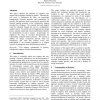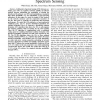60 search results - page 6 / 12 » Game Theoretic Modeling of Malicious Users in Collaborative ... |
CN
1998
13 years 7 months ago
1998
We introduce a method for predicting the network traffic that will be generated by Collaborative Virtual Environment applications with varying numbers of participants. Statistical...
INFOCOM
2009
IEEE
14 years 2 months ago
2009
IEEE
— Collaborative spectrum sensing among secondary users (SUs) in cognitive networks is shown to yield a significant performance improvement. However, there exists an inherent tra...
AUIC
2004
IEEE
13 years 11 months ago
2004
IEEE
This paper considers the problem of computer user support and workplace learning in general. Theoretically our work is influenced by ideas on knowledge management, expertise netwo...
ICC
2007
IEEE
14 years 1 months ago
2007
IEEE
— Recently, trust establishment is recognized as an important approach to defend distributed networks, such as mobile ad hoc networks and sensor networks, against malicious attac...
CORR
2010
Springer
13 years 7 months ago
2010
Springer
Abstract--Collaborative Spectrum Sensing (CSS) between secondary users (SUs) in cognitive networks exhibits an inherent tradeoff between minimizing the probability of missing the d...


